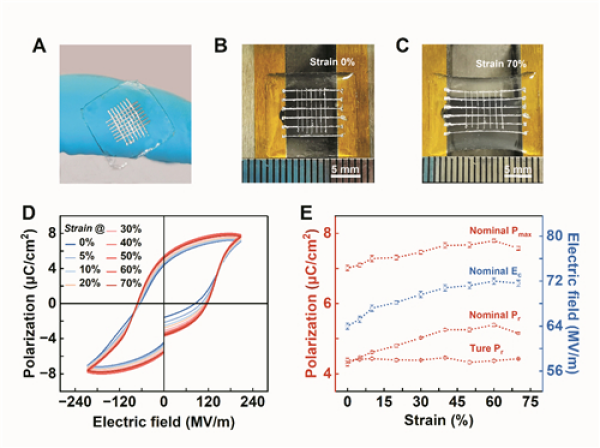Can anyone provide the title of the article. I can't bypass captcha in China.West are starting to realize how hard it is to process rare earth.
You are using an out of date browser. It may not display this or other websites correctly.
You should upgrade or use an alternative browser.
You should upgrade or use an alternative browser.
News on China's scientific and technological development.
- Thread starter Quickie
- Start date
West are starting to realize how hard it is to process rare earth.
"If you can innovate and bring solutions to market that produce rare earths efficiently, you have a tremendous market opportunity," said Nathan Picarsic, co-founder of the geopolitical consulting firm Horizon Advisory.
"If you have magic, you have a tremendous market opportunity."
Can anyone provide the title of the article. I can't bypass captcha in China.
Insight: World battles to loosen China's grip on vital rare earths for clean energy transition
Is this worth celebrating or is it still way too premature to pop the champagne? People that are very technically knowledgeable on this field please share your thoughts.
Scientists from Chinese Academy of Agriculture and Nanjing Agricatural University solved the long time puzzle of reproductive isolation between indica rice and japonica rice. If this can lead to a new hybrid rice between the two species, it is expected to produce 15% more grains than the existing hybrid species.
万建民院士团队阐明籼稻粳稻杂种不育分子机理破解水稻生殖隔离之谜
中国农业科学院和南京农业大学的科研团队经过13年的合作研究,系统鉴定了引起籼稻和粳稻杂种不育的位点,深入解析其中一个最主效位点的基因克隆和遗传、分子机制,解开了水稻生殖隔离之谜,为利用亚种间杂种优势培育高产品种提供了理论和技术支撑。7月26日,相关研究成果以研究长文的形式发表在《细胞(Cell)》上。
作物杂种优势利用是大幅提高粮食产量的重要途径。水稻分籼稻和粳稻两个亚种,我国北方多种植粳稻,南方多种植籼稻。上世纪七十年代以来,袁隆平先生研发的杂交水稻主要是利用籼稻亚种内的杂种优势,实现了水稻大幅增产,带来第二次“绿色革命”,为我国乃至世界粮食安全作出了突出贡献。一般来说,品种间亲缘关系越远,杂交优势越明显。据预测,如果籼稻和粳稻亚种间能育成超级杂交稻,可以比现有杂交水稻增产15%以上,因此如何利用亚种间的超强优势一直受到育种家的关注。然而,籼稻和粳稻之间存在严重的生殖隔离,其杂交种常表现出杂种不育现象,成为阻碍杂种优势利用的最大障碍之一。
万建民院士团队阐明籼稻粳稻杂种不育分子机理破解水稻生殖隔离之谜
中国农业科学院和南京农业大学的科研团队经过13年的合作研究,系统鉴定了引起籼稻和粳稻杂种不育的位点,深入解析其中一个最主效位点的基因克隆和遗传、分子机制,解开了水稻生殖隔离之谜,为利用亚种间杂种优势培育高产品种提供了理论和技术支撑。7月26日,相关研究成果以研究长文的形式发表在《细胞(Cell)》上。
作物杂种优势利用是大幅提高粮食产量的重要途径。水稻分籼稻和粳稻两个亚种,我国北方多种植粳稻,南方多种植籼稻。上世纪七十年代以来,袁隆平先生研发的杂交水稻主要是利用籼稻亚种内的杂种优势,实现了水稻大幅增产,带来第二次“绿色革命”,为我国乃至世界粮食安全作出了突出贡献。一般来说,品种间亲缘关系越远,杂交优势越明显。据预测,如果籼稻和粳稻亚种间能育成超级杂交稻,可以比现有杂交水稻增产15%以上,因此如何利用亚种间的超强优势一直受到育种家的关注。然而,籼稻和粳稻之间存在严重的生殖隔离,其杂交种常表现出杂种不育现象,成为阻碍杂种优势利用的最大障碍之一。
Huawei has sold over 130 million smart wearables.
this is something to watch out. Just how big the market is.
Huawei sells so many smart devices that rely on connectivity. Whoever ends up supply different RF chips to Huawei products will make a lot of money
this is something to watch out. Just how big the market is.
Huawei sells so many smart devices that rely on connectivity. Whoever ends up supply different RF chips to Huawei products will make a lot of money
A youtube video by Anton PetrovIs this worth celebrating or is it still way too premature to pop the champagne? People that are very technically knowledgeable on this field please share your thoughts.
Chinese scientists developed a highly-flexible, electrically-stable ferroelectric material by "slight crosslinking" 2 polymer chains through covalent bonds, allowing for applications in wearable devices due to good elastic recovery ability & stretchable design..


The Hong Kong Special Administrative Region government has invested nearly HKD 200 Billion (about USD 25.6 Billion) into innovation and technology in recent years, and the sector's ecosystem is flourishing..
HKSA has achieved certain accomplishments in attracting technology and innovation companies, as authorities have engaged with over 200 enterprises, with more than 25 already established or preparing to expand their operations in HK..

HKSA has achieved certain accomplishments in attracting technology and innovation companies, as authorities have engaged with over 200 enterprises, with more than 25 already established or preparing to expand their operations in HK..

Yeah. I study psychology and cognitive science and we are not close to how human mind works, let alone how to model it in a computer. Nevermind if we can build one even after knowing how mind works. We are like 3 steps before even considering GAI."when we understand how the brain work" is doing a lot of heavy lifting here. We really aren't close at all to understanding how the brain works. Without that, we can't create any AI model that has even a passing understanding of context. An understanding of context would result in AI never spitting out complete nonsense, never being so far off in recognition that a mailbox is identified as a cat, etc. We're nowhere close to that. Modern neuroscience has been around for over 300 years at this point and we're not particularly close to understanding how the brain works. So I think it's a very reasonable thing to believe that the puzzle won't be cracked within our lifetimes, although it might be cracked further down the road.
100 years ago the technology we are using today is only witchcraft to those who poorly considered the question. Physics itself has not changed. Follow function and not form, and you can predict many things although what form they appear in is not clear. People thought of flying around to other countries first in bird-like wings then balloons. They weren't wrong in function, only form. People also thought of using "computing devices" even in ancient times but they thought it would be through large and complicated water levers and then later, through gears.
So pretending the future is completely unpredictable is just that, pretending.
